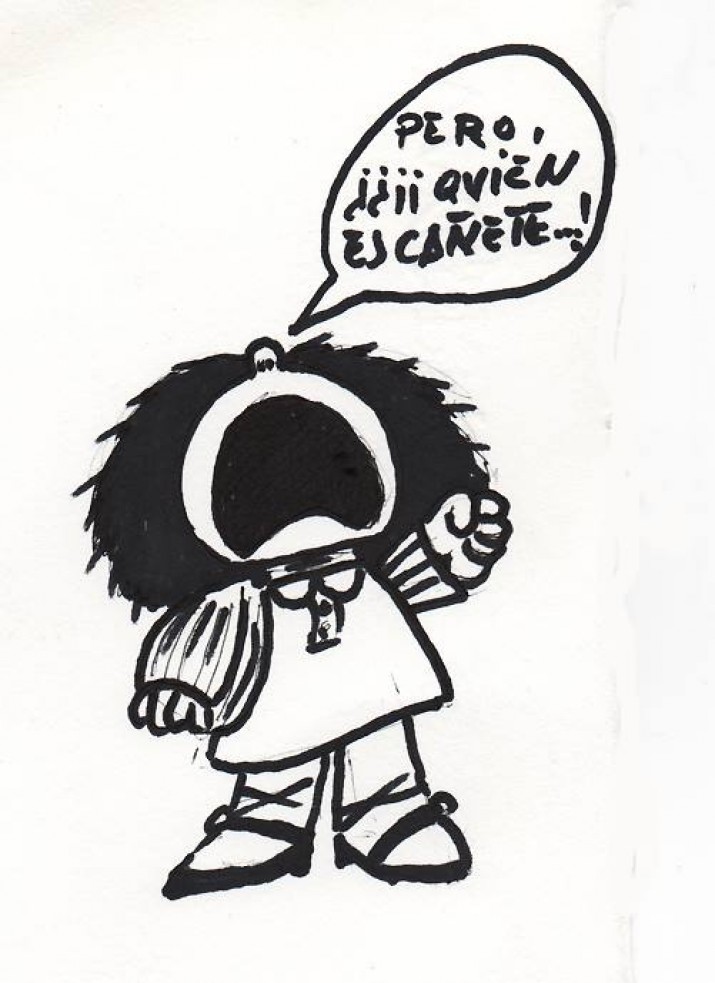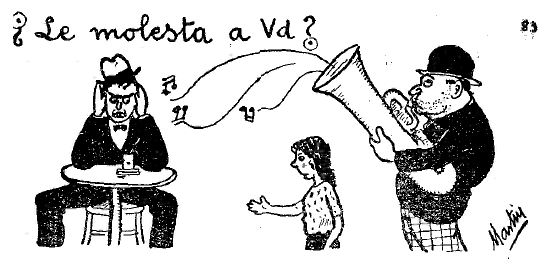
| Языки :: Испанский |
| Аудио |
 |
|
|
239 |
Español |
Spanish |
|
Lección Ochenta y tres (83) |
||
| ¿De qué se queja Vd.? | Of what are you complaining? | |
| 1 |
¡Ese Fulano es un idiota! ¡pues no va contando por ahí que me pidió veinte duros y se los dí (1)! |
That what's his name is an idiot! Does he not go telling everywhere [by here] that he asked me 20 douros and (that) I gave them to him? |
| 2 |
¿Y eso le molesta a Vd.? — ¡Ya lo creo! ¿No ve Vd. que eso me puede ocasionar otros sablazos? |
And this annoys you? — I think so! Don't you see that this can bring about more [other] tappings for me! |
| 3 |
La madre. — ¿No te parece que nuestra hija ha hecho grandes progresos en el canto? |
Mother. — Does it not seem to you that our daughter has made great headway in singing? |
| 4 |
El padre. — ¡Claro! Al principio sólo se quejaban los vecinos de la casa. Ahora se queja todo el barrio (2). |
Father. — It's obvious! In the beginning only the inhabitants of the house complained; now all the district complains. |
| 5 |
Usted me puso una dentadura postiza y me aseguró que sería como los dientes naturales (3). |
You put me a set of teeth and assured me that it would be like real teeth. |
| 6 |
Sin duda. — Pues bien, sus dientes falsos me hacen sufrir horriblemente. |
No doubt. — Well your false teeth make me suffer horribly. |
| 7 |
Entonces ¿de qué se queja? Ya le dije que eran como los naturales. |
Then what are you complaining of? I told you indeed that they were like the real ones. |
| 8 |
Epitafio. — Aquí un hablador se halla que por primera vez calla (4). |
An epitaph. — Here lies a chatterer, who keeps silent for the first time. |
| EJERCICIOS | EXERCISE : | |
|
Cantar Asómate a esa ventana, Bella dama, y te veré y con la luz de tus ojos, el cigarro encenderé. |
Show yourself at that window — fair lady, and I shall see you — and with the light of your eyes — my [the] cigarette I shall light. |
| NOTES. | |
| 1 |
Un idiota, una idiota, an idiot, a fool. ¡Qué disparate! or ¡Qué barbaridad! : It's foolish, idiotic! — Contar, to count or recount, tell. ¡Cuéntemelo! : Tell it me! — Se lo he contado todo : I have told you (or him) all. Se los dí, for le los dí, to him gave them. — Quejarse, to complain. — Voy a hacer una reclamación : I go to put in a complaint. — Voy a presentar una denuncia de esto : I go to lodge a complaint. |
| 2 | - |
| 3 |
Poner, yo puse, Vd. puso, to put, I, you put (preterite).
El diente, the tooth; el dentista, the dentist, |
| 4 |
Callar, to keep silent. — ¡Silencio!, Silence! — ¡Calle!, Be silent! — ¡Calla! Be (thou) silent! — Quien calla otorga, (he) who says nothing consents (authorizes) : él que no contradice en ocasión conveniente da a entender que aprueba. — Aprobar, to approve; probar, to prove; la prueba, the proof. |
|
Señora, femin. of señor is the current word for lady.
Dama (mujer noble o de calidad distinguida) corresponds to caballero. Likewise, bella is rather rare; but one says : el bello sexo, the fair sex. El cigarro, the cigar or cigarette. If one wants to make it clear that a cigar is concerned, one says : el puro. The cigarette : el cigarrillo, or el pitillo (dimin. of pito, a whistle). |
